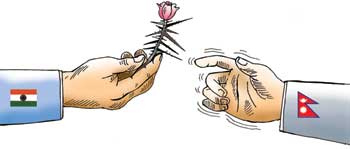 Whenever a new Nepali leader travels to India to pay his mandatory homage to the Delhi Darbar, the main question at home is always: what is he selling off this time? It is no different this week. Even before Prime Minister Sher Bahadur Deuba left on Wednesday for Delhi, parliamentarians were vociferously demanding that the veil of secrecy over the visit be lifted. This is understandable, because historically our leaders haven't brought back much from India. More often than not, they end up giving something away. Usually a river.
Whenever a new Nepali leader travels to India to pay his mandatory homage to the Delhi Darbar, the main question at home is always: what is he selling off this time? It is no different this week. Even before Prime Minister Sher Bahadur Deuba left on Wednesday for Delhi, parliamentarians were vociferously demanding that the veil of secrecy over the visit be lifted. This is understandable, because historically our leaders haven't brought back much from India. More often than not, they end up giving something away. Usually a river.
The level of Indian aid for infrastructure and other projects in Nepal is now the lowest it has ever been. And Deuba's present visit comes at a time of unprecedented national crisis. The Nepali state has never been this feeble, hence the suspicion in Kathmandu that Delhi will use this weakness to exact secret deals.
Our distrust of Big Brother is nothing new, and it pre-dates the independence of the Republic of India. The unified Nepal nation was a young and xenophobic entity, and we didn't trust the British East India Company in Calcutta. In fact the two belligerents collided and went to war in 1814.
With the Ranas, Nepal turned anglophile and in doing so, antagonised the native Indian public. Generations later, there is still residual historical memory among north Indians of Nepali soldiers coming to the rescue of the British in Lucknow in 1857, and of the involvement of Gurkha soldiers under General Dwyer in the Jallianwala Bagh massacre.
After independence, the love-hate relationship between us got more acute. And every new episode-from the 1950 treaty, through the Kosi agreement, the blunder of Rajiv Gandhi's blockade of our border, to Tanakpur and Laxmanpur, the Hrithik Roshan riots and the torturous talks to renew the trade treaty-confirmed Nepalis' worst fears about India's "grand design".
In the messy post-democracy period, it didn't help that our knee-jerk politicians milked latent anti-Indian sentiment for all it was worth at election time. One ex-prime minister (who shall remain nameless) even tried to assure Indian leaders during a visit to Delhi-after being elected on a vigorous anti-Indian platform-not to take his rabble-rousing speeches seriously because "aap samajte hain, elections mein kya kya karna padta hai".
Keeping relations tense and primed to be chronically at breaking point doesn't do the people of either of our countries any good. It is time we realised that the futures of Nepal and India are intertwined. The Nepali people and this country's governments must show pragmatism and look for ways we can take advantage of India's vastness, rather than working ourselves up into an insecure frenzy about it.
Indian leaders and business leaders, for their part, must realise that a prosperous and stable Nepal of 24 million potential consumers is in its own national interest. Petty-mindedness does not befit a nation of India's stature. Destabilising Nepal, and keeping it poor by hassling it on trade will help neither country.
It is hard to remember any time in the modern history of our nations when relations were actually cordial and constructive. The nearest we got to such a state was probably during the premiership of IK Gujral when the doctrine that went by his name took shape. The 1996 trade treaty dramatically boosted bilateral trade. Unfortunately, we never took full advantage of the treaty to put our own house in order by identifying products for a manufacturing and industrial base. The renewal of the treaty last month was two steps forward and three steps back, and signified, finally, the demise of the Gujral Doctrine. But our business elite must realise that greater value addition on exports is actually in our own long-term interests, not India's.
The list of festering problems with India is long: embankments along the border, Kalapani, Pancheswor, the cancellation of PIA overflights which penalises Nepal for the inability of India and Pakistan to get along, restrictions on Nepal's exports, delays in getting the Birgunj dry port going, and the state-instigated propaganda about ISI activities which has helped decimate Indian tourism to Nepal.
The latest thorn is the widespread perception in Nepal that the Maoists receive support from across the border. To be sure, the Indian foreign minister did hastily declare the Maoists "terrorists" in November. But Delhi hasn't moved much beyond that. The Indian government may not be supporting the Maoists, but it is not doing much to curb their activities on its soil either.
The lesson from all this is that bilateral relations between Nepal and India need to be addressed at the highest political level. We can no longer leave it to the babus on both sides. We can no longer try to solve the problems piecemeal as and when they crop up. As long as there is no political understanding between India and Nepal, there will always be some crisis or other threatening ties.


